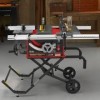Craftsman 21829 Operation Manual - Page 5
Make Sure The Work Area Has Ample Light - parts list
 |
View all Craftsman 21829 manuals
Add to My Manuals
Save this manual to your list of manuals |
Page 5 highlights
• NEVER perform any operation =freehand" which means using onlyyour hands to support or guide the workplace. AJwaysuse either the rip fence or miter fence to positionand guide the work. • NEVER stand or have any part of your body in line with the path of the saw blade. • NEVER reach behind, over,or within three inches of the blade or cutter with either hand for any reason. • MOVE THE RIP FENCE cut of the waywhen cruse cutting. • NEVER use rip fence as cutoff gauge when cross cutting, • NEVER attempt to free a stalled saw blade without first turning the saw OFF and disconnectingthe saw from the power source. • PROVIDE ADEQUATE SUPPORT to the rear end sides of the saw table for wide or longwork pisces. Use a sturdy "outrigger" support if a table extension more than 24 inches tong 'Isattached to the saw. • AVOID KICKBACKS (work thrown back toward you) b_r. a) Keeping bladesharp. b} Keeping r{pfence parallelto the saw blade. c) Keeping riving knife/spreader/splittera, nt_-kickback pawls, and blade guard In plase and operating. d) Not retsasingthe work before it is pushed a_tl he way past the saw blade usinga pushstick. e) Not tipping work that is twisted or warped or does not have a straight edge to guide along the fence. • AVOID AWKWARD OPERATIONS AND HAND POSITIONS where a sudden slip could cause your hand to move into the cuttingtool. • USE ONLY RECOMMENDED ACCESSORIES listed in this manual or addendums. Use of accessoriesthat are not listed may causethe risk of personal in'fury. Instructionsfor safe use of accessoriesareinc(uded with the accessory. • MAKE SURE THE WORK AREA HAS AMPLE LIGHTING to see the work end that no obstructionswill interferewith safe operationBEFORE performingany work usingthe table saw. I ALWAYS TURN OFF SAW before disconnectingit, to avoid accidentalstarting when reconnectingto power supply. ROUTER ACCESSORY SAFETY RULES • ALWAYS DISCONNECT SAW FROM POWER SUP- PLY BEFORE MAKING ADJUSTMENTS OR ADDING ACCESSORIES. Make sure the switch is off when reconnecting to power supply. • ALWAYS FEED WORKPIECE AGAINST THE ROTA- TKIN OF THE CUTTER. • DO NOT USE AWKWARD HAND POSITIONS. • KEEP FINGERS AWAY f_om therevolving cutter,and use fixtureswhen necessary. • ALWAYS USE THE DUST COVER for overhead guarding. • DO NOT REMOVE JAMMED CUTOFFPIECES until cutter or blade has stopped and tool has been disconnected from power source. • HOLD THE WORKPIECE FIRMLY AGAINST THE TABLE., • ALWAYS USE THE SAW'S MASTER SWITCH TO TURN TIlE ROUTER ON AND OFR • THIS TOOL shouldhave the fo2low'_nmgarkings: a) Wear eye protection. b) Use saw bla.deguard and rivingknife/sprsadsd splitterfor every operation for which it can be used, including all through sawing. c) Keep hands out of the line of saw blade. d) Use a pushstickwhen required. e) Pay particular attention to instructions on reducing Iisk otkickback. f) Do notperform any operationfreehand. g) Never reach around or over the saw blade. • SAVE THESE INSTRUCTIONS. Refer to them frequently and useto instruct other users. If you loan someone thLstool, Joanthem these instructJona also. _ WARNING: Some dust created by power sanding, sawing, grinding,drilling,and otherconstructionactiv_ies contains chemicals known to cause cancer, birth defects or other reproductiveharm. Some examples of these chemicals are: • lead from Isad-based paints, * crystallinesilica from bricks and cement and other masonryproducts, and = arsenic and chromiumfrom chsmicatly-_'satedlumber. Your risk from these exposures varies,depending on how often you do this type of work. To reduce your exposure to these chemicals:work in a well ventilatedarea, and work with approved safety equipment, such as those dust masks that are specialtydesignedto f_lterout microscopicparticles. 5














